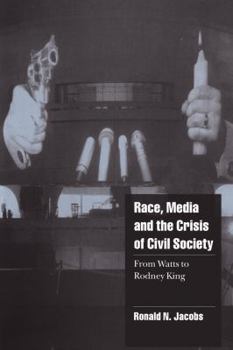Race, Media, and the Crisis of Civil Society: From Watts to Rodney King
(Part of the Cambridge Cultural Social Studies Series)
Select Format
Select Condition 
Book Overview
Since the early nineteenth century, African-Americans have turned to Black newspapers to monitor the mainstream media and to develop alternative interpretations of public events. Ronald Jacobs tells the stories of these newspapers--in New York, Chicago and Los Angeles--for the first time, comparing African-American and mainstream media coverage of racial crises such as the Watts riot, the beating of Rodney King, the Los Angeles uprisings and the O...
Format:Paperback
Language:English
ISBN:0521625785
ISBN13:9780521625784
Release Date:August 2000
Publisher:Cambridge University Press
Length:204 Pages
Weight:0.80 lbs.
Dimensions:0.5" x 6.1" x 9.0"
Customer Reviews
1 rating
Seminal Study
Published by Thriftbooks.com User , 23 years ago
Jacobs was on too something very substantial for sociology when he decided to investigate two major racial crises in BOTH the major and African American newspapers. Comparing such multiple publics in comparative perspective reveals what sociologists have suspected for years but were unable to articulate: The media serves as a powerful technology for maintaing the color line. While the African newspapers are shown to be an important contesting voice, we are shown that the major media's "white insincerity" perhaps not surprisingly distorted the larger debate of racial justice underscoring such crises as Watts and King (and now Cincinati). Yet such a "white insincerity", as we learn in this study, isn't as obvious as we might expect. Indeed, by employing a narrative analysis of such coverage Jacobs teaches us how a pervasive paternalistic ideology of white supremacy articulated in the major (white) newspapers as, what Jacobs calls a "tragic narrative," prevents such crises from generating any truly meaningful national dialogue on racial inequality and oppression. Such an excavation of the insidious racializing technologies of the hegemonic media is a fascinating and critical achievement in a field that, in many respects, has become out of touch and/or sterile on issues of race and culture (and definitely on the social role of the media as well).





